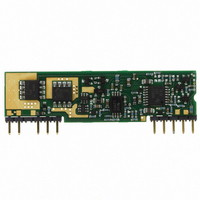YNV12T10-0G POWER ONE, YNV12T10-0G Datasheet - Page 5

YNV12T10-0G
Manufacturer Part Number
YNV12T10-0G
Description
CONVERTER DC-DC 12V 10A SIP
Manufacturer
POWER ONE
Series
Yr
Type
Point of Load (POL) Non-Isolatedr
Datasheet
1.YNV12T10-0G.pdf
(25 pages)
Specifications of YNV12T10-0G
Output
0.75 ~ 5.5V
Number Of Outputs
1
Power (watts)
55W
Mounting Type
Through Hole
Voltage - Input
9.6 ~ 14V
Package / Case
10-SIP Module
1st Output
0.75 ~ 5.5 VDC @ 10A
Size / Dimension
2.00" L x 0.28" W x 0.54" H (50.8mm x 7.1mm x 13.7mm)
Power (watts) - Rated
55W
Operating Temperature
-40°C ~ 85°C
Efficiency
94%
Approvals
cUL, EN, UL
Package
10SIP
Output Current
10 A
Output Voltage
0.7525 to 5.5 V
Input Voltage
12 V
Output Power
50 W
Switching Regulator
Yes
Input Voltage Range
9.6 V to 14 V
Input Voltage (nominal)
12 V
Output Voltage (channel 1)
0.7525 V to 5.5 V
Output Current (channel 1)
10 A
Package / Case Size
SIP
Output Type
Regulated
Product
Non-Isolated / POL
Lead Free Status / RoHS Status
Lead free / RoHS Compliant
3rd Output
-
2nd Output
-
Lead Free Status / Rohs Status
Lead free / RoHS Compliant
Other names
179-2377
Operation
Input and Output Impedance
The YNV12T10 converter should be connected via
a low impedance to DC power source. In many
applications, the inductance associated with the
distribution from the power source to the input of
the converter can affect the stability of the
converter. It is recommended to use decoupling
capacitors in order to ensure stability of the
converter
converter has internal input capacitance of 20 μF
with very low ESR ceramic capacitors.
In a typical application, low - ESR tantalum or
POS capacitors will be sufficient to provide
adequate ripple voltage filtering and at the input of
the converter. However, very low ESR ceramic
capacitors 47μF-100μF are recommended at the
input of the converter in order to minimize the
input ripple voltage. They should be placed as
close as possible to the input pins of the converter.
YNV12T10 has been designed for stable operation
with or without external capacitance. Low ESR
ceramic capacitors placed as close as possible to
the load (Min 47μF) are recommended for
improved transient performance and lower output
voltage ripple.
It is important to keep low resistance and low
inductance PCB traces when connecting the load
to the output pins of the converter in order to
maintain good load regulation.
ON/OFF (Pin 10)
The ON/OFF pin is used to turn the power
converter on or off remotely via a system signal.
There are two remote control options available,
positive logic (standard option) and negative logic,
and both are referenced to GND. Typical
connections are shown in Fig. A.
The positive logic version turns the converter on
when the ON/OFF pin is at a logic high or left
open, and turns the converter off when at a logic
low or shorted to GND.
MCD10202 Rev. 1.0, 24-Jun-10
and
reduce
9.6-14 VDC Input; 0.7525-5.5 VDC Programmable @ 10A
input
ripple
voltage.
YNV12T10 DC-DC Converter Data Sheet
Page 5 of 25
The negative logic version turns the converter on
when the ON/OFF pin is at a logic low or left open,
and turns Converter off when the ON/OFF pin is at
a logic high or connected to Vin.
ON/OFF pin is internally pulled up to Vin for
positive logic version, and pulled down for
negative logic version. A TTL or CMOS logic gate,
open collector (open drain) transistor can be used
to drive ON/OFF pin. When using open collector
(open drain) transistor with a negative logic option,
add a pull-up resistor (R*) of 75K to Vin as shown
in Fig. A; This device must be capable of:
- sinking up to 0.2 mA at a low level voltage of
0.8V
- sourcing up to 0.25 mA at a high logic level of
2.3V – 5V
- sourcing up to 0.75 mA when connected to Vin.
Remote Sense (Pin 3)
The remote sense feature of the converter
compensates for voltage drops occurring only
between Vout pins of the converter and the load.
The SENSE pin (Pin 3) should be connected at
the load or at the point where regulation is
required (see Fig. B). There is no sense feature on
the output GND return pin, where the solid ground
plane should provide low voltage drop.
If remote sensing is not required, the SENSE pin
must be connected to any of the Vout pins to
ensure the converter will regulate at the specified
output voltage. If these connections are not made,
the converter will deliver an output voltage that is
slightly higher than the specified value.
Vin
Vin
CONTROL
INPUT
R* is for negative logic option only
Fig. A: Circuit configuration for ON/OFF function.
R*
www.power-one.com
6
GND
Vin
ON/OFF
Nex
(Top View)
Converter
TM
-v
Series
SENSE
TRIM
GND
Vout
5
Rload












